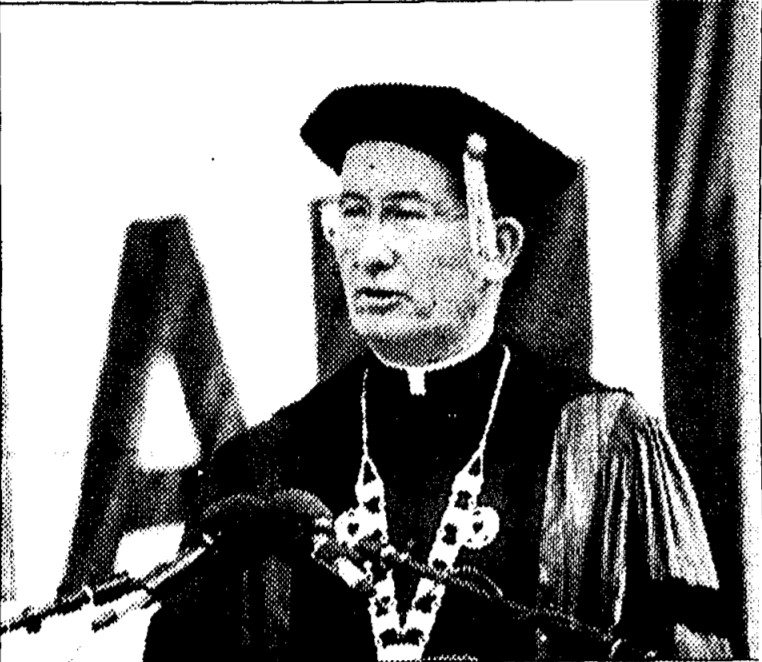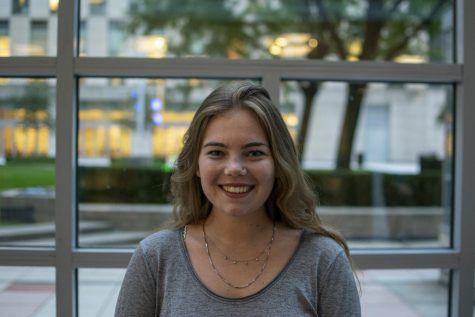Former President of Fordham Dies at 89
THE OBSERVER ARCHIVES
O’Hare speaking at his inaugural address in 1984, when he became the 31st president of Fordham.
April 6, 2020
On the morning of March 30, University President Rev. Joseph M. McShane, S.J., emailed the Fordham community to share that the Rev. Joseph A. O’Hare, S.J., the 31st president of the university, had passed away. He was 89.
William Sceney, O’Hare’s nephew, confirmed that he died from complications of liver cancer after his health began to decline since Christmas 2019.
O’Hare was born on Feb. 12, 1931, in the West Bronx, New York. His father Joseph O’Hare worked for the New York Police and his mother Marie was a teacher for New York City’s public schools.
He was the only Bronx-born president since Fordham was founded in 1841 — a point of pride, according to McShane’s email.
O’Hare joined the Society of Jesus when he was 17. In an interview with the New York Times in 1998, he described his faith as “not an otherworldly kind of spirituality — it’s the kind very geared to involvement in the present time.”
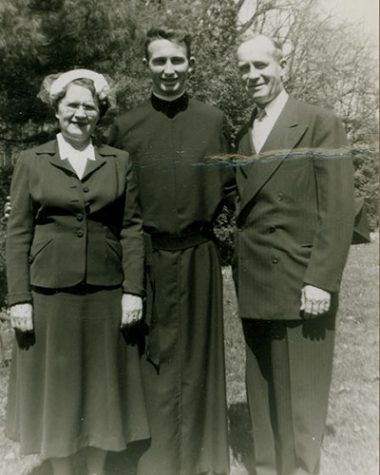
O’Hare with his mother and father.
The Jesuits assigned O’Hare to live and learn in the Philippines. He graduated in 1954 from Berchmans College in Cebu City, where he earned a master’s degree the next year.
He returned to the United States in 1959 to continue his theological studies at Woodstock College in Maryland. In 1968, he received a doctorate in philosophy at Fordham.
In 1975, O’Hare became Editor-in-Chief of America, a Jesuit magazine. There, he wrote a column for the publication which received four Catholic Press Association Awards. The Rev. Matt Malone, S.J., current editor-in-chief of America Media, referred to O’Hare as a “towering figure in the history of America magazine.”
O’Hare was inaugurated as president of Fordham University on Sept. 30, 1984, and served for 19 years, the longest-serving Fordham president.
Vice President for Administration Rev. George J. McMahon, S.J., presided over the inauguration ceremony and read letters from former President Ronald Reagan and Gov. Mario M. Cuomo to congratulate O’Hare.
“Your distinguished career in the Jesuits order and in the field of education speaks for itself,” Reagan wrote.
In his letter, Cuomo described O’Hare’s appointment as “a homecoming as well as an inauguration; a Bronx-born, Bronx-bred philosopher and writer and professor and priest coming back to where he began.”
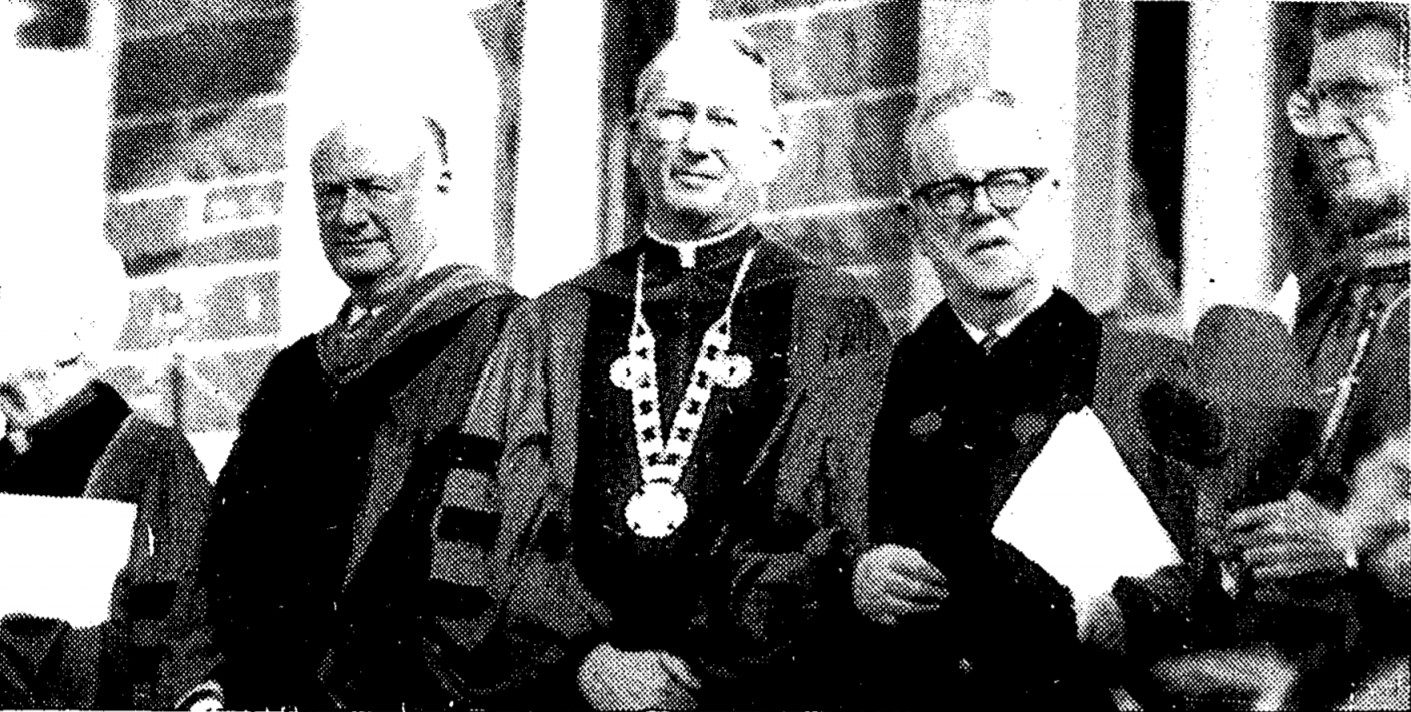
O’Hare (center) with former Mayor Edward Koch (left) and Archbishop John J. O’Connor (right) at his inauguration ceremony.
In his inaugural address to the university, O’Hare touched on Fordham’s identity as New York City’s Jesuit university.
“It is a common working assumption at Fordham that religious faith and critical intelligence are not contradictory habits of mind. It is important that the Catholic idea of relating faith and reason not disappear,” O’Hare said.
O’Hare became president of the university during economic and cultural instability in the Bronx, and many credit him for leading Fordham’s comeback.
Financial support for the university increased dramatically throughout O’Hare’s tenure: The Observer reported that the university’s endowment increased from $36.5 million to $271.6 million, and donations from alumni and friends increased 300%. Fordham’s applicant pool also increased from 4,500 in 1995 to 11,000 in 2002.
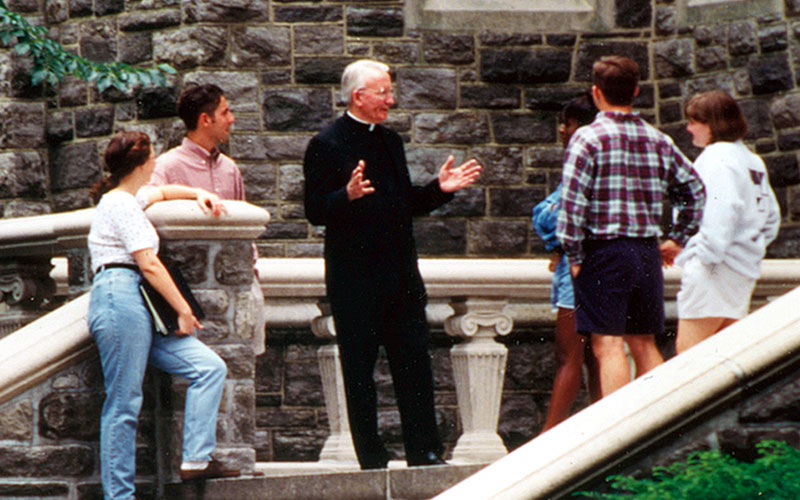
O’Hare talking with students at Rose Hill. According to Grimes, he knew more students by their first names than most university presidents.
He also oversaw the construction of the William D. Walsh Family Library in 1997 and four new dormitories on the Rose Hill campus. Lincoln Center’s first residential hall, McMahon, was also constructed in 1993.
The New York Times reported that before O’Hare’s presidency, 70% or more of Fordham’s students were commuters. When he retired, 70% lived on campus.
It was also under O’Hare’s leadership that Fordham instituted its core curriculum, intended to expose students to multiple disciplines which is at the heart of the Fordham academic experience today.
Rev. Robert Grimes, S.J., former dean of Fordham College Lincoln Center, lauded O’Hare’s commitment to the Fordham community. “I doubt there are many university presidents who knew as many students by their first names,” he told The Observer in 2002.
In April 1988, Former New York City Mayor Edward I. Koch appointed O’Hare as Chairman of the New York City Campaign Finance Board, an initiative devised to reduce the influence of money in city politics and expand citizen engagement. He was reappointed by Mayor Rudolph Giuliani in 1994 and again in 1999.
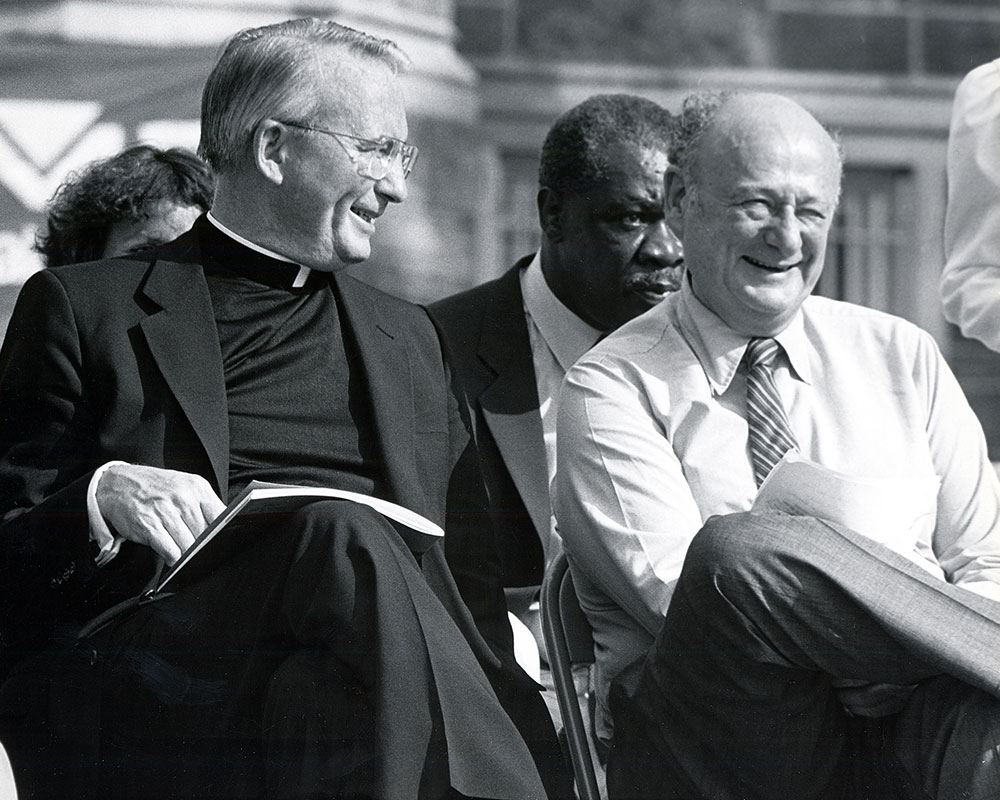
Koch appointed O’Hare the founding chair of the New York City Campaign Finance Board in 1988, a position he served with integrity for 15 years.
He served alongside Supreme Court Justice Sonia Sotomayor. “Father Joseph A. O’Hare was one of my heroes,” she said in a statement for America magazine.
Koch often praised O’Hare for his contributions to the Fordham and New York City community. When O’Hare retired from Fordham, Koch even expressed how he hoped the pope would remove the restriction of elected public office for priests, as he thought O’Hare should be the next mayor of New York City.
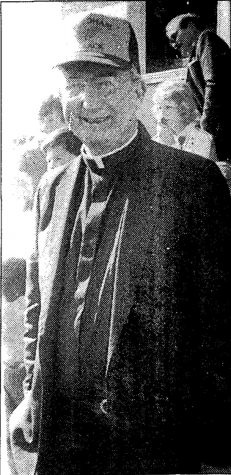
Fordham’s biggest fan at the 1984 Homecoming, when the Rams beat Holy Cross in men’s soccer 5-1 and beat Georgetown in football 28-6.
O’Hare never did run for political office. In a statement this week, describing O’Hare Mayor Bloomberg said “one of the very best never ran for office — but he has left a mark on politics like no other.”
On top of his political work, O’Hare remained committed to civic engagement and served as a leader to the Jesuit community.
During the civil war in El Salvador, six Jesuits, their housekeeper, and her daughter were shot and murdered in 1989. O’Hare was among the delegation of Jesuits that traveled to the country to pay respects.
“He was a national and international authority on Jesuit higher education,” McShane wrote.
When O’Hare retired as president of Fordham in 2002, he told The Observer that his greatest accomplishments were how he “affirmed a better understanding of Fordham’s identity as a Catholic institution and the reform of undergraduate education.” He was awarded 10 honorary degrees over the course of his career.
In the same interview, he said the most rewarding part of his job was “the opportunity to get to know so many people, the privilege of representing Fordham and seeing the respect we receive.”
Due to the coronavirus pandemic, O’Hare’s burial and funeral were kept private. However, McShane confirmed that a memorial Mass will be celebrated for O’Hare in the University Church when the Fordham community is able to reconvene safely.

